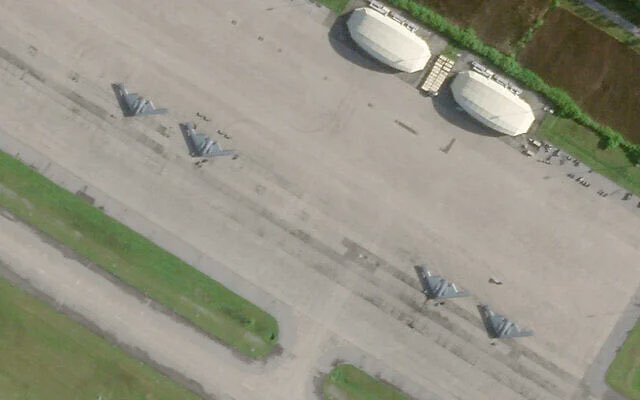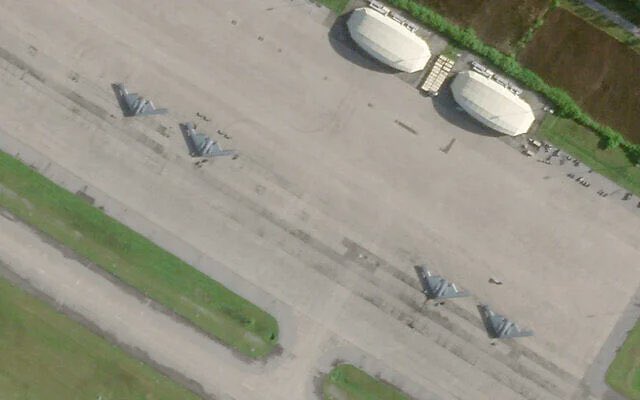BREAKING Iran Threatens to Strike Diego Garcia if Trump Attacks!
Iran’s Warning to the U.S. and the U.K. Over Potential Military Action
In a significant development, Iran has issued a stern warning regarding potential military action by the United States under the leadership of Donald Trump. This warning, reported by the Telegraph, underscores the escalating tensions between Iran and the U.S., particularly in the context of military engagement in the region. Iran has indicated that if Trump were to order an attack on its territory, Tehran would retaliate by targeting the U.S.-U.K. naval base located on Diego Garcia in the Chagos Islands.
The Strategic Importance of Diego Garcia
Diego Garcia is a strategically vital military base in the Indian Ocean. It serves as a key logistical hub for U.S. and U.K. military operations, providing support for air, sea, and surveillance operations in the region. Currently, the base is home to several B-2 bombers, which are capable of conducting long-range precision strikes. The presence of these advanced aircraft makes Diego Garcia an even more critical asset for the U.S. military.
Iran’s threat to strike this base is significant, as it highlights not only the potential for direct military confrontation but also the broader implications for regional stability. The Chagos Islands, where Diego Garcia is located, have been a point of contention in international relations, particularly regarding sovereignty and military presence.
Escalating Tensions Between Iran and the U.S.
The relationship between Iran and the United States has been fraught with tension for decades. Issues such as Iran’s nuclear program, its involvement in regional conflicts, and its support for proxy groups have led to a series of confrontations. The Trump administration’s approach to Iran, particularly the withdrawal from the Joint Comprehensive Plan of Action (JCPOA) in 2018, further strained relations.
- YOU MAY ALSO LIKE TO WATCH THIS TRENDING STORY ON YOUTUBE. Waverly Hills Hospital's Horror Story: The Most Haunted Room 502
Iran’s warning comes at a time when military posturing and rhetoric have intensified. The Iranian leadership has repeatedly stated its commitment to defend the nation’s sovereignty and territorial integrity. The threat to retaliate against Diego Garcia can be seen as a demonstration of Iran’s determination to respond to perceived provocations.
Implications for Global Security
The potential for conflict between Iran and the U.S. carries significant implications for global security. A military strike on Iran could lead to a broader regional conflict, involving various nations and non-state actors. The Strait of Hormuz, through which a significant portion of the world’s oil supply passes, is a critical chokepoint that could be affected by any escalation in hostilities.
Moreover, the U.S.-U.K. military presence in the Indian Ocean and the surrounding areas plays a crucial role in maintaining maritime security and ensuring the free flow of trade. Any disruption to this status quo could have far-reaching economic consequences, impacting global oil prices and trade routes.
The Role of International Diplomacy
In light of the escalating tensions, the importance of diplomatic efforts cannot be overstated. Engaging in dialogue and negotiations remains a crucial avenue for de-escalating the situation. International players, including European nations and regional powers, could play a role in facilitating discussions aimed at reducing tensions and preventing military confrontation.
The international community must remain vigilant as the situation unfolds. The consequences of military action could extend beyond the immediate region, affecting global political dynamics and economic stability.
Conclusion
Iran’s warning regarding potential retaliation against the U.S.-U.K. naval base on Diego Garcia underscores the fragile state of relations between Iran and the United States. As military posturing continues and rhetoric escalates, the need for diplomatic engagement becomes increasingly critical. The potential for conflict not only poses risks to regional stability but also has significant implications for global security and economic interests.
In this volatile environment, it is essential for all parties involved to prioritize dialogue and seek peaceful resolutions to avoid miscalculations that could lead to unintended consequences. The international community must work together to address the underlying issues that fuel tensions while promoting stability and security in the region.

BREAKING
Telegraph: Iran has issued a warning: if Donald Trump orders an attack on Iran, Tehran will retaliate by striking the U.S.-U.K. naval base on Diego Garcia in the Chagos Islands.
This base is currently hosting multiple B-2 bombers. pic.twitter.com/hZ6a2zr89d
— Open Source Intel (@Osint613) March 29, 2025
BREAKING
In a tense development, the Telegraph reports that Iran has issued a stark warning. They declare that if former President Donald Trump decides to launch an attack on Iran, Tehran will retaliate. Their target? The U.S.-U.K. naval base on Diego Garcia located in the Chagos Islands. This is a significant escalation in the already fraught relationship between the U.S. and Iran.
Understanding the Context
To fully grasp the implications of Iran’s warning, it’s essential to understand the history and strategic importance of Diego Garcia. This base has served as a pivotal military outpost for both the United States and the United Kingdom since the 1970s. It hosts a variety of military assets, including multiple B-2 bombers, which can undertake long-range missions. The presence of these bombers signifies that this base is not just a logistical hub; it’s a frontline military asset.
The Stakes Are High
Iran’s threats underscore the high stakes involved in any military engagement with the nation. It’s not just about potential bombings and military strategies; it’s about lives, regional stability, and global security. The Chagos Archipelago, where Diego Garcia is situated, has been a focal point of geopolitical tensions for decades, with implications that stretch beyond the immediate region.
What Iran’s Warning Means
When Iran warns of a strike on Diego Garcia, it’s not merely posturing. Such a statement reflects Tehran’s calculus on how to respond to perceived aggression. It signals to the U.S. and its allies that Iran is prepared to escalate the situation dramatically. The potential for retaliation could also mean Iran is willing to strike at the heart of U.S. military capability in the Indian Ocean, making it clear that they will not back down without a fight.
Military Implications
The presence of B-2 bombers on Diego Garcia raises the stakes even further. These aircraft are capable of penetrating advanced air defenses and delivering precision strikes. If Iran follows through on its threat, the U.S. would need to respond decisively to protect its assets and deter further Iranian aggression. This situation could easily spiral out of control, leading to a broader conflict that could impact global oil supplies and economic stability.
Historical Precedents
Historically, threats of retaliation have often led to military escalations. For instance, the Gulf War and the ongoing tensions in the Middle East showcase how quickly situations can deteriorate. The U.S. has previously engaged in conflicts based on perceived threats, and Iran’s warning may indicate that they are prepared to use their military capabilities in response to any aggression. This historical context emphasizes the need for caution and diplomacy in addressing these tensions.
International Reactions
Global reactions to Iran’s warning have been varied. Some nations are urging restraint, while others see it as a justification for bolstering their military presence in the region. The dynamics are complex, with regional players like Saudi Arabia and Israel closely monitoring the situation, as any conflict involving Iran could have far-reaching consequences. The call for diplomatic solutions is louder than ever, as the risk of miscalculation grows.
The Role of Diplomacy
In light of these developments, the importance of diplomacy cannot be overstated. Engaging in talks and negotiations could provide an avenue to de-escalate the situation. The international community should encourage dialogue rather than military action. Diplomatic channels, such as the Joint Comprehensive Plan of Action (JCPOA), have previously helped manage tensions with Iran, although its current status is precarious.
Public Sentiment
Public sentiment about military action against Iran varies widely. Many people are weary of war, especially after decades of conflict in the region. The American public, in particular, may be hesitant to support military interventions, as previous engagements have often led to prolonged conflicts with uncertain outcomes. Understanding this sentiment is vital for policymakers as they navigate these turbulent waters.
What Lies Ahead
The future remains uncertain. With tensions escalating, the potential for conflict looms large. Iran’s warning serves as a reminder of the delicate balance of power in the region. It’s crucial for all parties involved to tread carefully and prioritize diplomatic solutions over military actions. The stakes are too high for miscalculations, and the consequences could be dire.
Final Thoughts
As we watch these developments unfold, it’s essential to stay informed and engaged. The geopolitical landscape is constantly changing, and understanding the implications of Iran’s warning about Diego Garcia is vital. The world is watching, and how the U.S. and its allies respond could shape the future of international relations for years to come. Let’s hope that cooler heads prevail and that diplomacy takes the forefront in addressing these escalating tensions.

